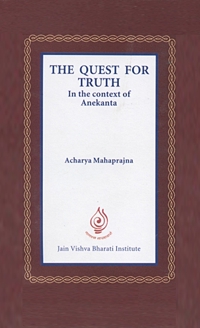
When we are studying commonness, we can see supreme existence and when we are studying specificity we can see the other existence. This is not a dimension of the supreme existence. It is a dimension of our perspective. We can never see both the visions together. Sometime we see commonness through the specific and sometimes the specific through commonness. If we see from the perspective of commonness, we can see a part of the truth of supreme existence. If we see from the perspective of the specific, we can see a part of the truth of the other existence. This relative explanation neither conflicts with idealism nor materialism. The idealist seeks to establish the reality of only the commonness and the materialist seeks to establish only the independence of objects.
The knower is separate from that which is known. If the knower was not separate from the known then there can be no relationship between the two. A relationship is established between two. There cannot be a relationship in one. The reality of the known is not dependent on the knowledge of the knower. It is not created at the time of the knower's reckoning nor does it disappear in the moments of his ignorance. The idealists argue that if the known was independent then everybody should have equal experience of it but that does not happen. A single object is seen and known from different angles by different people. The reason for this difference is in our minds. This logic is not very well formed. Our knowledge is relative. That is why a single object is seen, known from different angles by different people. Place, time, contexts, taste, prior beliefs, inclination, the capacity of the mind’s power to absorb are all factors that contribute to relativity. This relative perspective acquiesces with the materialist's view that the material object is not in our minds.
Betrand Russell's statement is significant. He said that the tree is not in our minds. Thoughts about the tree are in our minds but not the tree itself. Only when the reality of the object is separated from the mind can there be a relationship between the knower and the known. F.C.S. Schiller has accepted this even though he is an idealist. He says that just like objects need the mind, the mind to reflect, needs objects. The philosophy of anekanta established the principle of interrelatedness (jatyantar). Its essence is that there are no separate attributes like difference and similarity. Where there are differences, there are similarities and where there are similarities, there are differences. The difference-similarity combine is reality. The knower is not always different from the known. If they were always separate, then there would be no relationship between them. If they were always the same then too there can exist no relationship between the two. They are of different types. The knower and the known are not dependent on each other and so they are independent. The knower and the known are mutually sustaining and so they are interdependent.
The argument of Shelling that the existence of the soul, the knower, depends upon the existence of the objects of knowledge and the existence of the objects of knowledge depends upon the existence of the knower does not hold water. This is because existence is more fundamental than the relations of the knower and the object of knowledge. Where there is reality there can be relationships. Relationships do not define reality. To be and to validate are not the same thing. It cannot be accepted that before atoms were proven they did not exist. Validity is dependent on the development of knowledge, but reality is not dependent on knowledge. Its dependence is on its own intrinsic qualities.
We know not only material objects but also the matter of the consciousness. The knower is only consciousness but the known can be both sentient and insentient. Just as material objects are independent of knowledge; one soul is independent from another. There are many souls. That is why while a soul is the knower while it knows another soul it also becomes the known when another soul knows about it. Material objects can only be known while the soul can be both known and the knower. The statement that objects should not be made a thought is equally true as the statement of the great philosopher Kant that thought should not be made objects.
Anekantavad has reflected on object and thoughts with relative perception. In supreme reality there is no difference between thoughts and objects. In the other reality there is difference between thought and object. Idealist Shelling has accepted that the soul and anti-soul are necessary for each other. No one state can exist without another. This acceptance gets approval from anekantavad. According to it that which is true contains within it, its opposite also. Without the opposite the primary one is not proved. In this situation, materialism is also partial truth. Idealism and materialism become part of untruth when they are independent of each other and by being mutually relative become partial truth. Without the acceptance of supreme reality the object and the fundamentals of its mutual relationships cannot be explained. Without accepting the independent attributes of an object, special attributes cannot be explained. A balanced explanation of the two can be given only withthe acceptance of supreme reality and independence of the objects. Acharya Mahaprajna
Acharya Mahaprajna


